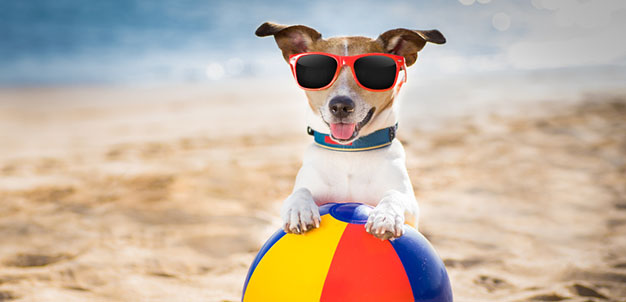Table of Contents
Can dogs be brought to the beach and the sea? And how to disentangle rules and prohibitions?
Full summer and craving for the sea. Have you decided to take your dog to the beach and are on your first “beach” experience?
We will give you a number of practical tips for dogs at the beach, so that your time together by the sea will be enjoyable for you and your dog but with full respect for the equal right of enjoyment of other bathers.
In fact, know that there are rules to follow and regulations to observe if you do not want to incur heavy penalties and enjoy the sunshine in the company of your pet.
First, let us make a distinction between free beaches and bathing establishments.
The dog on the beach: eminent domain or free beach
Unfortunately, a gap in the law gives rise to many misunderstandings: to date, there is no law regulating animal access to the maritime domain at the national level.
For dogs on the beach, the precautions that govern access in public places generally apply: leash and muzzle in tow, and droppings bags to accompany them.
Since municipal governments or the harbormaster’s office can independently regulate where and how dogs can enter the beach, always inquire in advance if there are any regional or municipal ordinances that prohibit dogs from entering the beach.
The sign informing about the no trespassing MUST be clearly displayed and publicized and must specify and state:
-The hourly extent of the ban
-The signature of the mayor or the commander of the traffic police.
-Reference to the ordinance (the ordinance itself must be published on the municipal notice boards of individual municipalities)
In the absence of these indications, the ban may be considered invalid.
And again: no other private citizen, but ONLY law enforcement can invite you to leave (provided they have informed you of the existence of the prohibition order, its reference number and its expiration).
It is your right to demand to read its contents.
In the event of refusal or denial, make a note of the law enforcement exponent’s personnel number and write to the Public Prosecutor’s Office, copying the relevant agency (municipality, harbormaster’s office, Carabinieri Command).
The Public Official in question is criminally liable for the crime of OMISSION OF OFFICIAL ACTS under Article 328 of the Criminal Code.
If in addition to the invitation to “move away” from the beach, you have also been issued an administrative penalty, you can challenge it and appeal to the Justice of the Peace.
A single noncompliance in its drafting is enough to make it null and void: the lack of a sign prohibiting dogs on the beach, or the lack of indication of the number and date of the ordinance.
Dogs on the beach: bathing establishments and concession beaches
It is different for beaches given under concession, that is, those on which bathing establishments are located. Such areas are off limits to dogs if there is a specific request from the manager.
In fact, the beach manager has the authority to make the stretch of shoreline obtained under concession inaccessible to dogs except for rescue dogs and guide dogs for the blind.
Bau beach: the sea is pet friendly with dog-friendly beaches
This explains the existence of “dog beaches,” so-called Bau Beaches.
These are specially equipped establishments where dogs are allowed on the beach.
However small their numbers are across the country, the trend is for a steady growth of dog-friendly beaches.
This is due to the gradual increase in requests from vacationers to be able to take their dogs with them.
A prerequisite condition for allowing dogs on the beach is that they be regularly vaccinated.
The health booklet must be shown at the entrance: DON’T FORGET IT!
And don’t forget the harness, leash and muzzle either: otherwise owners and dogs may be denied access to the beach.
Dogs at the beach: the four-legged beach bag
Here are the contents of your dog bag with everything you need that should never be missing:
-Sunscreen
-Hydrating cream
-Wipes
-Spray
-Sun shade
-First Aid Kit
-Salvage
-Toilet bags
-Water and bowl
-Soothing shampoo
Take care of your four-legged umbrella companion
Dogs’ plantar pads are sensitive to heat: sand and rocks “burn” to such an extent that even you have to use sandals or flip-flops to avoid getting burned.
Apply appropriate protective ointments to protect your dog’s fingertips to prevent dehydration.
Short or shorthaired dogs with light coats and pink skin are more prone to sunburn.
Use dog sunscreen on hairless areas: nose, mouth, abdomen, tip of ears and base of tail.
In the absence of a specific cream, your veterinarian will be able to point you to an alternative product: usually a cream for very sensitive skin or for children as long as it is free of zinc oxide.
Use moistened wipes to remove grains of sand from the snout: by dint of rubbing to remove them, the dog may get scratched.
It is recommended that you bring a dog first aid kit in the unfortunate event that you should need one that contains: disinfectant, hydrogen peroxide, band-aid, tweezers, blunt-tipped scissors, sterile gauze, elastic bandage and saline solution.
The use of a dog life jacket is strongly recommended.
Less experienced dogs will not take risks during water raids, and for swimming veterans, however, it will be a valuable ally by helping them with buoyancy and making them less tired.
In this regard, do not assume that your dog loves to swim.
If he hesitates to enter the sea, don’t force him: give him time to familiarize himself with the water.
Salt spray, or the salt elements in seawater, can cause dermatitis and dryness of the hair.
Rinse the dog with fresh water, never ice, to remove sand and salt. Also use a soothing and moisturizing shampoo periodically; your veterinarian will be able to recommend one of all those currently available.
Mandatory to have a supply of hygienic bags for droppings.
Leaving the environment you frequent clean is a due, civilized and respectful act to the right of others.
Dogs at the beach: beware of heat stroke
ALWAYS keep a fresh, clean bowl of water available for your dog.
The heat will cause him to drink more frequently than usual.
And mind you don’t drink seawater: salt water causes vomiting, gastrointestinal distress, dysentery.
Set up a sheltered, shady corner for him.
In pet accessory stores you can choose special sun shades to make napping as comfortable as at home.
Use the sprayer to refresh the dog when not soaking in water or during nap time.
This simple and playful gesture will help him cope better with the heat and avoid incurring heat stroke.
Before planning a beach vacation with your dog, schedule a preventive checkup.
In addition to checking its general health status, your veterinarian can recommend specific products to take on the road.
Contact the veterinary doctors on our staff for visits and consultations at any time.
Clinica la Veterinaria does not go on vacation: our staff is always at your disposal, every day h24 including holidays and with Emergency Service from 8 pm to 8 am.
For the joy of seeing them HAPPY.











